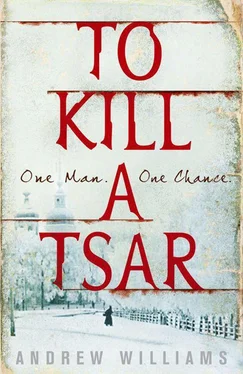She paused to consider whether she should answer, then reluctantly: ‘He left me two years ago.’
‘Anna,’ he said breathily, taking a step towards her.
‘Please,’ she said, her hand hovering above her lap as if hoping to push what she knew to be coming away. ‘Please.’
‘I’ve fallen in love with you.’ He edged closer to the table: ‘No, sit please, don’t move.’ He held his hand close as if to restrain her.
‘Please, Alexander, we’re comrades…’
‘Marriage is nothing. A prison. But love — we can help each other. Comrades, yes, and lovers,’ and he bent down a little and touched her arm.
She shrank from him. ‘I don’t love you… this, this is damaging the revolution. There is no place for…’
Mikhailov bent swiftly, reaching for her cheek with trembling fingers, so close, the smell of her, her breasts beneath the cotton blouse: ‘I love you…’ His voice was barely more than a whisper. And he touched her hair, the back of her head, trying to draw her closer, but she pulled herself free.
‘No!’ She jumped to her feet, her chair crashing to the floor. ‘We’re comrades!’ she said angrily from the other side of the table. ‘Comrades, that’s all. I think you should go.’
Mikhailov’s face felt hot. He was struggling to hold his temper. He never lost his temper. Who did she think he was? He turned away from her and threw himself down on to the couch. ‘Is it the Englishman?’
‘No!’ she said indignantly. ‘No. It’s you.’ She was still standing at the table, arms wrapped anxiously around herself. ‘Go, please.’
‘This English doctor can’t be trusted. He isn’t one of us, you know that?’ Mikhailov said coldly.
‘It’s nothing to do with him. Now go. Please.’
‘Tell him not to come to the clinic. It’s too dangerous.’
‘Look, I’m sorry, I’ve hurt you, but…’
‘Don’t be ridiculous! You haven’t hurt me. I only care about what is best for our cause, best for the people. And you should think of that too.’
‘I do,’ she said quietly.
Silent seconds ticked by as they stared at each other. The walls of the room seemed to press upon them in the flickering light of the lamp like the sides of a box. In the end, it was Anna who looked away and down at the table.
‘Before you go,’ she said coolly, ‘I want to remind you that we agreed the doctor could be of use to us. He has connections. We agreed that. And he has already proved his worth. There was a body in the street today…’
‘I know,’ said Mikhailov. ‘The Director told me.’
‘The Director? But why did he think the death of a beggar in Peski worth mentioning?’ There was an intense frown on her face.
‘Because he was a police informer.’
‘Dr Hadfield was sure he was murdered by someone who knew what they were doing. Did you kill him?’
‘This is getting us nowhere,’ he said coldly. ‘The security of the movement is my concern.’ Getting quickly to his feet, he stepped up to the table and, placing his chubby hands upon it, he leant across until he was only an arm’s length from her: ‘Leave first thing tomorrow. I will see you in Voronezh. And think about what I’ve said. In the next few weeks we will make brave decisions that will change this country for ever. You will play your part, I know.’ He stared at her for a silent few seconds, his face hard with certainty. Anna did not flinch. Turning at last, he snatched his hat from the table and walked to the door, only glancing back as he opened it to where she stood in the shadow. It closed with a quiet click and she was alone.
For a time, news of Madame Volkonsky’s arrest helped set the seal on further contact with the clinic and the women who worked there. In the days that followed her detention a sharp knock on the door or raised voices in the street sent a chill down Frederick Hadfield’s spine and he would wait with bated breath for the police to burst into the room.
But life went on as always, his hospital duties consuming more of his time, his list of well-to-do patients longer by the day. He had been treated with new respect at the Nikolaevsky since the closure of Department 10. Colleagues were grateful for the opportunity to share their problems with him, even when he was manifestly unqualified to solve them. And it proved to be a welcome distraction, a chance to make new friends and cement relations with old ones. A week passed, then two, and fear of arrest and the pain it would cause his family slipped away to be replaced by a dull ache that pressed heavier on his spirit. At empty moments of the day and at night, he was unable to free himself from thoughts of Anna, her small rough hands, the frown lines on her brow, the ice blue sparkle of her eyes, the timbre of her voice and their awkward parting. Of course, it had been foolish to press her about her friendship with this ‘Alexander’ and downright impertinent to wring from her the admission that she was married. It was apparent from the embarrassed silence that had followed the revelation that she deeply regretted it and was in no mood to confide more. A hasty and confused goodbye, and a feeling on his part at least that their paths were unlikely to cross again. But he had a duty to the clinic. If he dropped his Sunday commitment it would be evident to Anna he was more interested in her than his patients and that was something he did not want to admit, even to himself.
So on a hot July Sunday Hadfield took a cab to the dusty square in front of St Boris and St Gleb once more. Gazing through the tangle of scaffolding, it seemed to him that not a brick had been added to the church in the month since his last visit. The filthy streets were oppressive with the stench of human waste familiar to those tied by poverty or duty to the city in summer. In the waiting room of the clinic, the dvornik was patrolling the crowded benches as before, grumbling officiously about the noise and the mess the children were making of his floor. ‘Can I help you?’ A well built middle-aged woman in a starched white headscarf and pinafore bustled up to him.
‘Dr Hadfield. I work here sometimes.’
‘Oh?’ She looked puzzled. ‘I wasn’t told you were coming.’
‘Is Miss Kovalenko here?’
‘No.’ Miss Kovalenko was not at the clinic. Miss Kovalenko was visiting her mother near Kharkov. Miss Kovalenko’s mother was very ill. No one was sure when she would return or if she was intending to do so.
‘And Miss Figner?’ he asked. ‘Is she also visiting her sick mother?’
The nurse coloured a little. ‘I don’t know a Miss Figner, Doctor.’
No one knew more or would say. Hadfield had met none of the four women on duty at the clinic before but they knew of him, and he felt obliged to stay. Trudging back to the square at the end of the day, he felt relief, even satisfaction, that he had managed to clear the benches. It had helped to take the edge off the disappointment of knowing Anna was not at his side. Perhaps the attraction, the strange connection he felt between them, would break and she would drift away until it was impossible to imagine the curve of her hips or the line of her face or the precise blue of her eyes.
This dull thought was with him through the week, and the following Sunday he made his way to the clinic again. The same four women were there but they had heard no word from Anna. And as he ministered to his patients’ cuts and infections, the diseases of hunger and neglect, he reflected that while it was often simple to treat the body, the mind was almost always a lost cause.
The Glen family were at their dacha near a spa town on the Gulf of Riga, where the general was taking the waters to ease his arthritis. Hadfield had declined an invitation to join them. Lady Dufferin had left for England and was not expected to return to St Petersburg before the autumn. In her absence, the third secretary at the embassy had taken on the role of master of revels to alleviate the boredom and isolation of those left in the city. Hadfield found himself pressed into a ‘diplomatic theatrical’, a new piece called La Belle de Venise written in French and Russian. Dobson was taking a part, too, and for a week or so they dined together then rehearsed rather drunkenly in the correspondent’s apartment. Neither of them made an effort with their lines until it became clear Lord Dufferin was taking the occasion rather more seriously and had invited a number of ambassadors and senior government figures to the performance.
Читать дальше












